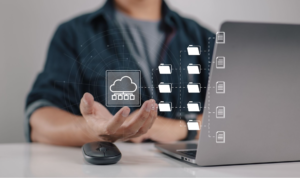What are the benefits of ERP systems in retail? Simply put, they bring all your business functions together.
This cohesion is key in a sector that demands quick adaptation to trends and consumer preferences.
In this article, we’ll explore how NetSuite redefines retail operations.
From improving customer relationships to streamlining back-end processes and finances, you’ll see how this platform can transform your business from average to top-tier.
Partnering with Cumula 3, we ensure a seamless integration of NetSuite into your operations.
With our expertise and proven track record, Cumula 3 Group is your ideal guide to harnessing NetSuite’s full potential and transforming challenges into opportunities for growth.
Want to stay competitive in retail? Schedule a free demo and get a pricing estimate tailored to your business needs.
ALSO READ:
→ Acumatica vs NetSuite: What You Need to Know Before Deciding
→ Evaluating NetSuite Implementation Costs: Selecting Your ERP Solution
Overview of NetSuite for Retail
As retail evolves, so does the need for a more agile, scalable technology solution.
NetSuite offers just that—a cloud-based ERP designed specifically for the complexities of the retail industry.
Here’s why it’s a game-changer for retailers:
- Cloud-Based Efficiency: By operating in the cloud, NetSuite cuts down on IT overhead and boosts accessibility. You can manage your retail business from anywhere, anytime, with just an internet connection.
- Tailored for Retail: NetSuite has features designed specifically for the retail sector, such as Real-time inventory management, advanced pricing strategies, and integrated customer loyalty programs. These tools go beyond mere management and enhance growth and customer engagement.
- Scalability: As your business expands, whether it’s adding new locations or scaling operations internationally, NetSuite scales with you. This ensures that your ERP system meets your needs, regardless of your company’s size.
- Integration Capabilities: NetSuite’s ability to integrate with other essential software—like e-commerce platforms and CRM systems—creates a seamless ecosystem. This integration streamlines operations, making your business more efficient and responsive to market demands.
In summary, NetSuite for Retail is not just about managing your day-to-day; it’s about expanding your capabilities and future-proofing your business.
ALSO READ:
→ Cumula 3 Group Included in Accounting Today’s VAR 100 List for 2023
→ Your Roadmap to Manufacturing Efficiency: Key Points for ERP Software Selection
5 Features of NetSuite for Retailers
The right tools can mean the difference between surviving and thriving for retailers.
NetSuite offers a suite of key features designed to address every aspect of retail management, ensuring you’re equipped to excel in today’s competitive market.
Here are the standout features of NetSuite that make it a must-have for any retailer:
1. Inventory Management
Stay on top of your stock with real-time inventory tracking and management across multiple locations.
Here’s a detailed table to break down the feature of Inventory Management in NetSuite for retailers:
| Feature | Description | Benefits |
| Real-time Inventory Tracking | Tracks inventory levels in real-time across all locations, updating stock quantities as sales and purchases occur. | Ensures accurate stock levels, reduces the risk of overselling, and helps make timely replenishment decisions. |
| Multi-Location Management | Manages inventory across various store locations, warehouses, and even internationally. | Streamlines inventory processes across all locations, providing a unified view of stock levels. |
| Demand Planning | Analyzes sales trends and predicts future inventory needs based on historical data. | Helps in planning for future demand to prevent stockouts and excess inventory. |
| Stock Replenishment | Automated reordering of products based on predefined stock levels. | Minimizes manual ordering processes and ensures optimal stock levels are maintained. |
| Inventory Cost Management | Tracks and manages the inventory cost over time, accounting for variables such as shipping and handling. | Provides a clear view of inventory costs, aiding financial planning and pricing strategies. |
Such capabilities ensure that retailers maintain efficient and accurate inventory control, which is vital for operational success and customer satisfaction.
2. Customer Relationship Management (CRM)
Build and maintain customer relationships with tools that improve service and track every interaction.
NetSuite’s CRM capabilities allow you to create a personalized shopping experience by understanding customer preferences and purchase history, which leads to increased customer loyalty and repeat business:
| Feature | Description | Benefits |
| Customer Data Management | Centralizes all customer data including contact information, purchase history, and preferences. | Enhances personalization and allows for targeted marketing strategies. |
| Interaction Tracking | Logs every interaction with customers, whether in-store, online, or via phone/email, creating a comprehensive view of customer engagements. | Provides insights into customer behavior and preferences, enhancing service and loyalty. |
| Sales Force Automation | Automates key sales processes, from lead management to purchase completion, ensuring no opportunities are missed. | Streamlines sales processes improves efficiency, and increases sales conversion rates. |
| Marketing Automation | Tools for automating marketing campaigns, from email marketing to social media posts, based on customer data and behavior. | Improves campaign effectiveness, enhances customer engagement, and optimizes marketing spending. |
| Customer Support and Service | Offers integrated tools for customer support, including ticket management, case tracking, and a self-service portal for customers. | Increases customer satisfaction and loyalty by resolving issues quickly and efficiently. |
| Loyalty Program Management | Manages customer loyalty programs, including rewards, points, and special promotions, all integrated into the CRM system. | Encourages repeat business and enhances customer retention through tailored rewards and promotions. |
| Reporting and Analytics | It provides robust reporting tools and analytics for monitoring CRM metrics, helping customers make informed decisions based on customer data. | Allows for data-driven decisions to improve customer relationships and business strategies. |
This table provides a comprehensive look at NetSuite’s CRM capabilities, showing how retailers can leverage it to improve customer engagement and drive sales.
3. Point of Sale (POS) Solutions
Unify your sales channels with integrated POS solutions that connect in-store and online sales.
This integration provides a smooth transition for customers between online browsing and in-store purchasing, enhancing the overall shopping experience.
| Feature | Description | Benefits |
| Omni-channel Integration | Seamlessly integrates in-store sales with online and mobile platforms, creating a unified sales environment. | Enhances customer experience and increases sales avenues. |
| Real-time Data Synchronization | Ensures sales data is updated in real-time across all channels, maintaining inventory and pricing accuracy. | Prevents sales discrepancies and enhances inventory management. |
| Customer Management | Access to customer data at the point of sale, including purchase history and preferences. | Personalizes the shopping experience and boosts customer loyalty. |
| Payment Processing | Supports multiple payment methods and currencies, facilitating transactions securely and efficiently. | Expands customer base and streamlines checkout process. |
| Sales Reporting and Analytics | Generates detailed reports on sales performance, customer trends, and inventory status. | Provides insights for better decision-making and strategy adjustment. |
Focusing on how each feature contributes to streamlining retail operations and enhancing the customer shopping experience, this table outlines the key aspects of NetSuite’s POS solutions.
4. E-commerce Integration
Manage your online presence with seamless e-commerce integration.
Here’s a breakdown of the E-commerce Integration feature in NetSuite, highlighting how it streamlines online sales management for retailers:
| Feature | Description | Benefits |
| Centralized Management | Manage all e-commerce operations from a single platform, including websites and mobile apps. | Simplifies operations, reduces errors, and saves time. |
| Website Integration | Seamlessly syncs product information, pricing, and inventory between NetSuite and your e-commerce site. | Ensures consistency and accuracy across online platforms. |
| Mobile App Compatibility | Ensures that mobile apps are fully integrated for a unified shopping experience across all devices. | Enhances the customer experience on smartphones and tablets. |
| Customer Data Sync | Automatic synchronization of customer data across the online and offline channels. | Provides a holistic view of customer interactions and preferences. |
| Order Management | Streamlines order processing, from placement to delivery, including returns and exchanges management. | Increases efficiency, improves customer satisfaction. |
| Real-Time Updates | Updates inventory and pricing information in real-time across all platforms. | Prevents stockouts and pricing discrepancies. |
| Analytics and Reporting | Generates detailed reports and analytics on web traffic, conversion rates, and customer behavior. | Helps in making informed decisions and strategizing growth. |
Each feature enhances operational efficiency and customer satisfaction, ensuring retailers thrive in a competitive digital marketplace.
5. Financial Management
Gain complete control over your finances with comprehensive tools that cover everything from accounting and revenue recognition to compliance.
Here’s a detailed breakdown of what this feature includes:
| Feature | Description | Benefits |
| Accounting | Full capabilities for general ledger, accounts receivable, accounts payable, and asset management. | Streamlines financial operations and reduces errors. |
| Revenue Recognition | Manages revenue recognition processes in compliance with accounting standards such as ASC 606. | Ensures accurate and timely financial reporting. |
| Budgeting and Forecasting | Tools for detailed financial planning and analysis, enabling proactive management of business finances. | Aids in better financial decisions and future planning. |
| Tax Management | Automated tools for tax calculations, compliance, and reporting. | Reduces risk of errors and ensures compliance with various tax regimes. |
| Financial Reporting | Real-time financial reporting and analytics capabilities. | Provides instant visibility into financial performance. |
| Multi-currency Support | Supports transactions in multiple currencies, managing exchange rates and currency impacts. | Facilitates international sales and operations. |
| Audit and Compliance | Built-in audit trails, support for compliance reporting, and internal controls management. | Enhances transparency and adherence to regulations. |
This table provides a snapshot of how NetSuite’s Financial Management feature can benefit retailers by ensuring comprehensive control and oversight of all financial aspects of their business.
NetSuite’s tailored features for retailers are designed to manage and elevate a business.
With advanced tools for inventory, customer relationships, sales, e-commerce, and finance, NetSuite equips retailers to meet the challenges of a dynamic industry head-on.
These capabilities ensure you can focus on growth and customer satisfaction, knowing the backend is smooth and efficient.
ALSO READ:
→ NetSuite or Salesforce: Which is Better for Your Business?
→ Get Ready for NetSuite: Insider Tips
Tailoring NetSuite for Your Retail Business
Implementing a new ERP system like NetSuite can seem daunting, but it can be streamlined and effective with the right approach and Cumula 3’s expert guidance.
From initial consultation to post-implementation review, Cumula 3 Group supports you at every step, leveraging NetSuite’s extensive ecosystem of SuiteApps for even greater functionality.
Here’s how we can help you set up NetSuite for your retail operations and tailor it to fit your specific needs:
- Initial Consultation: Begin with a detailed assessment of your current processes and systems to determine your specific needs.
- Project Planning: Develop a project implementation plan that includes timelines, resources, and milestones.
- Data Migration: Carefully plan and execute the migration of your existing data to NetSuite, ensuring accuracy and continuity.
- System Configuration: Configure NetSuite to align with your business processes, including setting up inventory, CRM, POS systems, and financial management functionalities.
- Integration: Integrate NetSuite with other critical systems like e-commerce platforms, payment processors, and third-party logistics.
- User Training: Conduct comprehensive training for all users on how to use NetSuite effectively in their daily roles.
- Go-Live Support: Provide intensive support during the initial go-live phase to address any issues promptly.
- Post-Implementation Review: Evaluate the system’s performance and gather feedback to make necessary adjustments.
A. Customization Options for Different Types of Retail Operations:
- Product-based Retailers: Tailor inventory management features to handle diverse product types, sizes, and colors.
- Service-oriented Retailers: Customize customer interaction tools to schedule and manage services, such as appointments or classes.
- Hybrid Retailers: Develop functionalities that cater to both product sales and service offerings, ensuring seamless operation across all business aspects.
B. Overview of Training and Support Provided by NetSuite:
- Training Programs: NetSuite offers various training formats including online, in-person, and customized training sessions to ensure users are proficient in using the system.
- Ongoing Support: Access to a dedicated support team for troubleshooting and update assistance.
- Community Access: Join an extensive community of NetSuite users and experts who share insights, best practices, and solutions.
With structured implementation steps, extensive customization options, and robust training and support systems, Cumula 3 Group and NetSuite ensure that your retail operation is equipped for success from day one.
ALSO READ:
→ What’s Hot: Software Trends for Chain Restaurants
→ Southern Rebar & Supplies: A Look into Manufacturing
Comparing NetSuite with Other Retail ERP Solutions
Choosing the right ERP system is crucial for the success of any retail business.
Let’s compare NetSuite with other popular ERP solutions like Microsoft Dynamics 365 and SAP:
| Feature | NetSuite | Microsoft Dynamics 365 | SAP |
| Functionality and Usability | Integrated, user-friendly suite designed for quick adoption. | Highly customizable, and integrates well with other Microsoft products but more complex. | Robust capabilities, better for large enterprises but less user-friendly. |
| Cloud-Based Solution | Pure cloud ERP offers real-time data access and operational agility. | Cloud-based, flexible, and integrates with Azure services. | Offers both on-premise and cloud solutions, which may complicate transitions. |
| Cost Effectiveness | More cost-effective with lower upfront and maintenance costs. | Potentially costly with additional customization and integration fees. | Higher implementation and maintenance costs, are justified for large organizations. |
| Scalability | Easily scalable, adjusts readily to business growth and market changes. | Scalable but can be complex and costly to scale with additional modules. | Scalable, though typically requires substantial initial investment. |
| Comprehensive Features | All-in-one solution with ERP, CRM, POS, and e-commerce. Continually updated. | Comprehensive, but may require extensive customization for full integration. | Extremely comprehensive but often requires custom development. |
| Single Version Advantage | A single software version ensures all users have the latest features without compatibility issues. | Multiple versions can lead to discrepancies and integration challenges. | Multiple versions may lead to inconsistencies and additional upgrade costs. |
NetSuite’s single-version advantage is a game-changer. It offers consistency and cutting-edge updates without the compatibility issues faced by other ERP systems like Microsoft Dynamics 365 and SAP, which may have multiple versions and higher maintenance costs.
ALSO READ:
→ Cumula 3 Group Secures Position in Bob Scott’s Top 100 VARs 2023
→ The True Financial Impact of Avoiding Warehouse Software
Conclusion – NetSuite for Retail
We’ve unpacked the essentials of NetSuite as a standout cloud ERP solution tailored for the dynamic retail sector.
From robust inventory management to integrated customer service and streamlined financial processes, NetSuite empowers retailers to operate more efficiently and adaptively.
Here’s why NetSuite stands apart: it operates on a single-version model.
This means every user benefits from the latest features as soon as they’re released, ensuring all retailers are equipped with cutting-edge tools without the lag or disruption of multiple-version upgrades.
This focus allows NetSuite to continuously enhance its platform and rapidly deploy new functionalities, driving business growth and innovation.
For those managing traditional on-premise systems, the contrast is clear.
Such setups often involve higher upkeep costs, from server maintenance to staffing, not to mention the slower pace of innovation due to the complexities of managing multiple versions.
Looking to compete smarter in retail? Start with a demo and get pricing insights from Cumula 3 Group to plan your next move.







